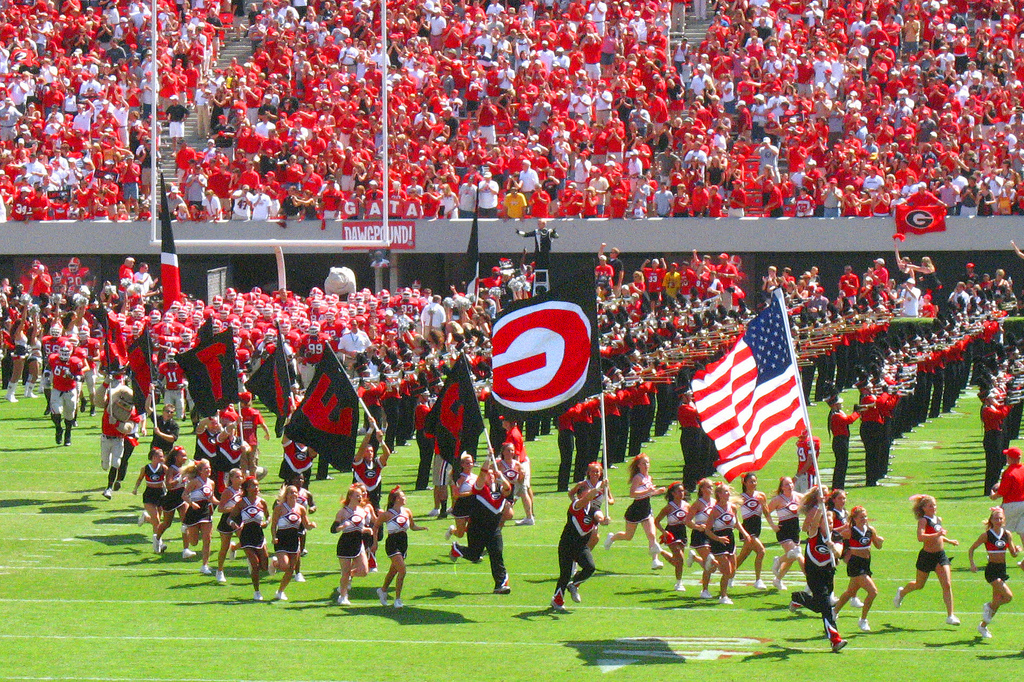By: Alex Edquist

The week after Georgia’s stunning football victory over Clemson, I got a text from my father. He had worn Georgia paraphernalia to the Atlanta airport, and one of the TSA officers had said “Go Dawgs” and then told him that he pulls aside Florida Gator fans for “random” pat downs.
My first reaction was to laugh. My second reaction was to text back, “Someone give that man a raise!”
But imagine if instead of “Florida Gator fans,” the TSA officer admitted to targeting another group for not-so-random pat downs. Say he pulled aside citizens of Middle Eastern countries. Or say a police officer pulled over black drivers for not-so-random checks. Or say the Internal Revenue Service selected Tea Party groups for not-so-random audits.
In sports, especially in college football down South, behaviors that would otherwise be repugnant are acceptable. Last year when UGA played Clemson, both Georgia fans and Clemson fans had signs that read “South Carolina fans can’t read this!” In the week before we played LSU, “LSU fans smell like corndog” jokes were abundant. Just ask Florida State how awful sports fans can be: when the school started an “Ask Jameis” hashtag on Twitter to promote their Heisman-winning and crab-leg-stealing quarterback Jameis Winston, the questions that were asked were things like “When Publix shows man coverage at checkout, what happens if you don’t see the manager drop in safety help over the top?” and “You went undefeated on the field. And also in the court room. Do you consider yourself the next OJ?”
Humans like picking sides. In prehistory, loyalty to a tribe was essential for survival; strangers generally couldn’t be trusted. That tribalism hangs over today as people align themselves with sports teams, political parties, religious denominations, and an infinite number of another affiliations. And we like sticking with the sides we’ve chosen. Research has shown that people tend to listen to sources that agree with their point of view and ignore those that disagree with it. This invariably leads to conflict as both sides, having absorbed sources supporting them and disregarded sources that didn’t, are convinced that they’re right.
Oftentimes the side of a conflict one ends up on is based solely on happenstance. For example, whether a person cheered or disapproved of Atlanta Falcons fans egging the buses of the visiting New Orleans Saints two years ago probably depended mostly on whether that person was raised in Georgia as a Falcons fan or in Louisiana as a Saints fan. Whether Ukrainian citizens fight for or against the Russian-backed rebel group in Donetsk is often explained by where they were born and whether they speak Ukrainian or Russian.
Ethnic, national, or religious tribalism is obviously destructive. One only needs to look at the bitter conflicts between Israelis and Palestinians in Gaza, between Chinese and Japanese in the Senkaku Islands, or between Sunni and Shiite in Iraq and Syria for evidence of that.
However, even milder forms of tribalism – ones that supposedly depend on choice rather than birth – can be destructive. In the United States, political parties are looking increasingly like tribes. Just like Hindu Indians rebuked by their families for marrying Muslims or Georgia students shunned by their friends for bringing Florida fans to a party, Democrats and Republicans are frequently shunned by their own parties for working across the aisle. Look at Eric Cantor, a Republican politician and former House Majority leader who lost his seat in a wild upset to a candidate who successfully painted him as someone willing to work with the Democrats on immigration reform.
Tribalism naturally carries with it a desire to defeat the other side. Sports fulfill that desire with regular matches against the other side. If a sports team loses, there is always hope that they will get better and win the next year (just ask Georgia Tech fans). That doesn’t work so well with political parties – elections may be a good way of determining which side is the winner and which is the loser, but the parties actually have to work together in the interim, and lately, it seems like the Democrats and Republicans have adopted the “hope they’ll be better and win the next year” model instead of governing. That desire is downright destructive when the sides’ only avenue to defeat the other seems to be through war, as in Ukraine or in the Middle East.
Humans are always going to be tribal animals. There’s something innately satisfying about being for one team or another. However, we have to be careful about how we fulfill our need for tribalism. Little good can come from aligning ourselves with a nation, a religion, or a political party and defending it at any cost. But doing so with a sports team? That’s just being a good fan.
Oh, and Florida fans – be careful in the Atlanta airport!

